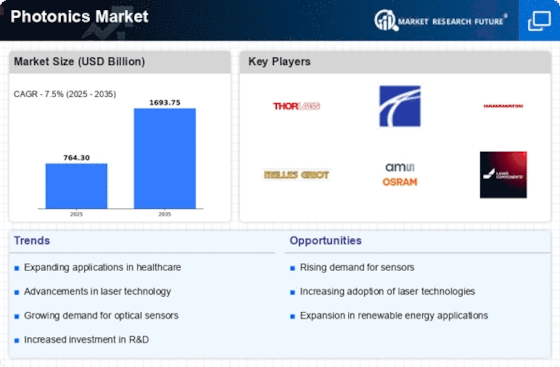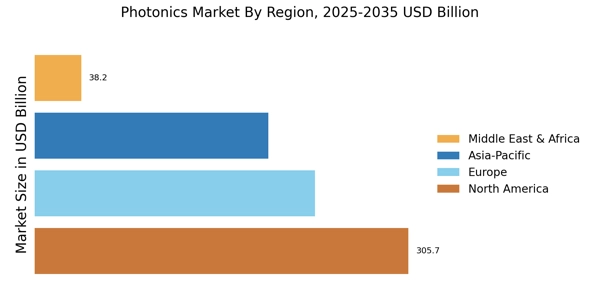Growth in Consumer Electronics
The Photonics Market is significantly influenced by the growth in consumer electronics, which increasingly incorporates photonic technologies. Devices such as smartphones, tablets, and smart home products utilize photonic components for enhanced functionality. The market for consumer electronics is expected to surpass 1 trillion USD by 2025, with photonics playing a crucial role in improving display technologies, sensors, and communication systems. Innovations such as OLED displays and advanced imaging systems are becoming commonplace, driving demand for photonic solutions. As consumer preferences shift towards high-performance and energy-efficient devices, the Photonics Market is poised to benefit from this trend, potentially leading to new applications and market opportunities.
Advancements in Laser Technology
The Photonics Industry is experiencing a surge in advancements in laser technology, which is driving innovation across various sectors. Lasers are increasingly utilized in manufacturing, telecommunications, and medical applications. For instance, the development of high-power lasers has enabled precision cutting and welding processes, enhancing productivity and reducing waste. The market for laser systems is projected to reach approximately 15 billion USD by 2026, indicating a robust growth trajectory. Furthermore, the integration of laser technology in medical devices, such as surgical lasers, is revolutionizing treatment methodologies, thereby expanding the scope of the Photonics Market. As industries continue to seek efficient and effective solutions, the demand for advanced laser technologies is likely to escalate.
Emergence of Quantum Technologies
The Photonics Market is witnessing a transformative phase with the emergence of quantum technologies. Quantum computing and quantum communication are areas where photonics plays a pivotal role, enabling unprecedented processing power and secure data transmission. The quantum technology market is anticipated to grow significantly, with estimates suggesting it could reach 1 billion USD by 2025. This growth is likely to stimulate further investment in photonic research and development, fostering innovation within the Photonics Industry. As organizations explore the potential of quantum technologies, the demand for photonic components, such as single-photon sources and detectors, is expected to rise, creating new avenues for growth and collaboration.
Increased Focus on Renewable Energy
The Photonics Market is increasingly aligned with the global shift towards renewable energy solutions. Photonic technologies are integral to the development of solar energy systems, particularly in photovoltaic cells that convert sunlight into electricity. The solar energy market is projected to grow at a compound annual growth rate of over 20% through 2025, highlighting the critical role of photonics in this sector. Additionally, advancements in photonic materials are enhancing the efficiency of solar panels, making them more accessible and cost-effective. As the demand for sustainable energy solutions escalates, the Photonics Market is likely to experience substantial growth, driven by innovations that support renewable energy initiatives.
Integration of Photonics in Automotive Applications
The Photonics Industry is increasingly integrating photonic technologies into automotive applications, particularly in the realm of advanced driver-assistance systems (ADAS) and autonomous vehicles. Photonic sensors, such as LiDAR, are essential for enabling real-time environmental perception, which is crucial for vehicle safety and navigation. The automotive photonics market is expected to grow significantly, with projections indicating a value of over 5 billion USD by 2026. This growth is driven by the rising demand for safety features and the push towards autonomous driving technologies. As automotive manufacturers continue to innovate, the Photonics Market is likely to expand, providing essential components that enhance vehicle performance and safety.
















